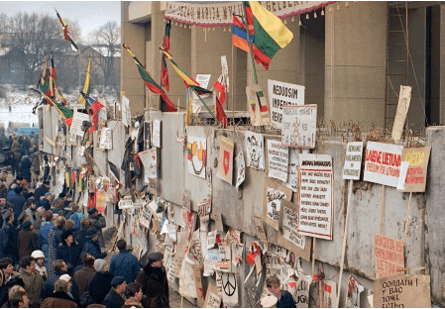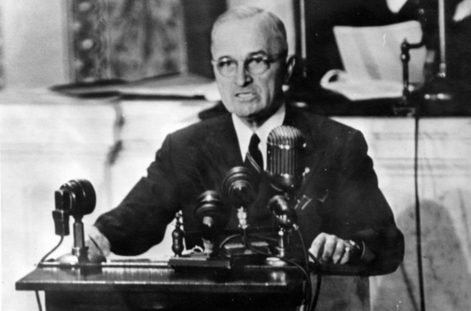The United States of America emerged as a key actor in world politics during World War 2. Following the collapse of the Soviet Union, the US established itself as a superpower. The journey of the United States’ foreign policies and its subsequent impact on international relations has been seen in multi-dimensional ways. The labels the superpower has been given in light of its role in the global political landscape have varied from “peacekeeper” to “global police” and “imperialist.” A country that was in recent history is seen as a predominantly “isolationist” trading nation fashioned its stronghold on world politics not just because of its economic and military strength; the United States’ unique journey of forming alliances and diplomatic relations has to be seen as a vital aspect of its journey to the top, to the point where the world not only accepts but actively expects the US to be a mediator of sorts. Furthermore, ultimately how likely is the United State’s supremacy in the political landscape to remain uninterrupted in a time where global threats are changing forms; for example, climate threats and international conflicts which are no longer as likely to manifest themselves as armed warfare, rather take the form of economic hegemony.

Source: The Atlantic
The alliances the US formed during the Cold War are crucial of the US and anti-communist politicians aimed at establishing a network of “military bases and economic interventions” (McElroy, 2015) globally. This development is something they were able to achieve by joining hands with the capitalist class of free-market businessmen who were able to form international trade relations throughout the world (McElroy, 2015). During the Cold War, there was an expansion of the North Atlantic Treaty Organization. Today the alliances formed in World War II contribute enormously to the US’ position as a world power. Although initially considered a cost the US has to bear to protect the alliance during times of conflict; it cannot be ignored that the US has a vested interest in being present in times of conflict in Europe or Asia. These regions are of geopolitical interest to the US. If these regions were under threat of being hit by external conflicts, it would have severe economic and political implications for the United States (Brands and Feaver, 2017). This analysis also sheds some light on why the political interventions carried out by the US tend to be selective; for example, the US’ reluctance to step back from the Iraq-Iran conflict because the region has strategic geopolitical importance being located in the Middle East, in contrast with its relative negligence towards conflict in countries like Somalia. With the end of the Cold War, NATO alliances changed in nature but remained intact, and they will continue to do so as long as there is a prolonged benefit to the US of being able to assume the most central role in world politics.

Source: Business Insider and Thomson Reuters
There is a need to delve deeper into the United States’ role as an international peacekeeper concerning its foreign policy. The Liberal International Order gives a picture of a heavily involved nation in global matters as it encourages “liberal internationalism,” giving way to increased globalization. The Truman Doctrine is a pledge to help any country suppress communist sentiments during the Cold War. Historically, the Truman Doctrine has been seen as the turning point of American foreign policy. It initiated a pattern for the United States to set up governmental bodies and intervene in internal conflict times in nations like Greece (McElroy, 2015). Now that the US army continues to be undisputable, the most powerful in the world, there is fragmentation in the conflicts faced by the US. Communism is no longer a threat the US faces; instead, the threats change from homegrown terrorism to climate change (Thalakada, 2012). The Liberal International Order can be seen as a different name under which interventions by the US are carried out, but without the threat of an impending war against communism, US interventions are not readily accepted as they were in the mid-late 20th century. Hence, this world order receives numerous damaging criticisms: “liberal internationalism” actively erases ethnic diversity and pushes significant cultural differences into the background (Acharya, 2020). This homogenization is not only imperialistic but also a tool used to perpetuate Western supremacy. The lack of alternatives produced against this world order is sufficiently indicative of its singular interests.

Source: Council on Foreign Relations and Harry S Truman Museum
It is necessary to separate the US from its “peacekeeper” image and view it as a country, not an entity responsible for being an international mediator. An active stakeholder in world politics cannot be expected to be unbiased. However, organizations like the International Monetary Fund and the United Nations assume their positions to understand this simple fact. These organizations are American attempts at maintaining its political and economic leverage within countries becomes increasingly apparent, as the UN follows in the footsteps of the United States in being strategically selective with its intervention, for example, the UN’s inability to give any concrete assistance to Palestine. The UN’s mechanism to ensure peace is the Security Council, within which the US holds veto power. This unbalanced form of capacity further skews the power dynamics in the US’ favour and prevents the UN from combatting human rights violations. This analysis also sets into perspective that political power supersedes humanitarian causes, and peacekeeping is pushed much further into the background at the end of the day. The adoption of the Responsibility To Protect by the UN has further legitimized US interventions. The US infringes on the sovereignty of nations over military operations or through organizations like the IMF, maintains ever-changing but still fruitful alliances, and powerful ideological tools and soft power.
Despite being faced with unprecedented challenges in the 21st century, American imperialism seems to be adjusting itself to maintain its stronghold. These efforts to remain in the centre of world politics are ample proof that the United States is not ‘the reluctant imperialist’ it is made out to be in certain discourses. An apt quote counters this argument: “Alliances do not cause US entanglements overseas, entanglements cause alliances” (Brands and Feaver, 2017, p.18). Conclusively, US “entanglements” across the world may take on the façade of attempts at peacekeeping, yet it does not mask imperialistic violence.
This article exclusively represents the author’s views and research, and does not reflect the position of The Youth Center for Research.
About the Author: Rida is a visiting Research Fellow and a third-year student at Habib University, Pakistan majoring in Social Development and Policy.
References
Acharya, A. (2020). Hegemony and Diversity in the ‘Liberal International Order’:
Theory and Reality. Retrieved 12 July 2021,
Brands, H.,& Feaver, P. (2017). What are America’s Alliances Good for?.
The US Army War College Quarterly: Parameters, 47(Article 4).
McElroy, W. (2015). How America Became the World’s Policeman.
The Independent Institute.
Retrieved from https://www.independent.org/news/article.asp?id=6336
Thalakada, N. (2014). Unipolarity and the evolution of america’s cold war alliances.
Palgrave Macmillan.
Author: Rida Fatima Ahmed
Date: 12th July 2021

